Talk about the death of the Wagner boss
“Even in hell he will be the best”
By Marko Schlichting
08/24/2023 03:09 am
The head of the Wagner army Yevgeny Prigozhin is said to have died in a plane crash. In the evening, Markus Lanz briefly changes the topic of his ZDF talk show and talks about it with the former German ambassador to Russia, Rüdiger von Fritsch.
The breaking news is a surprise. The head of Russia’s notorious Wagner Army, Yevgeny Prigozhin, is said to have been killed in a plane crash. The information is sparse at first, ntv and ntv.de report in detail. At first there are doubts about the reports. After all, the source, the Russian state news agency TASS, is not always a guarantor of the truth. In the meantime, the first images have appeared on the social media platform Telegram, showing that Prigozhin has boarded the plane in question – the source and veracity are unclear. But members of the Wagner troupe also assumed Prigozhin’s presumed death, speaking of the traitor Putin and calling Prigozhin a hero. A comment from Telegram: “Even in Hell HE will be the best.”
Markus Lanz also reacted impressively quickly on Wednesday evening and overturned his original program concept. He invites four new guests to a very late night talk show. One of them: the former German ambassador in Moscow, Rüdiger von Fritsch. He tries to classify the situation in Russia as well as possible despite the little reliable information.
“Area of Speculation”
“We are moving in the realm of speculation,” says the diplomat. However, he makes it clear that after Prigozhin undertook his “March on Moscow” with several hundred soldiers two months ago, his life was in danger. Von Fritsch: “Even back then, people said he shouldn’t go out on the balcony on the third floor of any house.” Nevertheless, von Fritsch is not sure at the time of the Markus Lanz show either. “What seems unusual is that this thing happened in Russia.”
At this point in time, he seems to consider the truthfulness of the Russian reports to be questionable. Von Fritsch explains: “We have to see that the Russian leadership will always want to explain everything, so that there must be reasons for what happened. So if they actually bring down a Russian machine from the sky within national territory, possibly even with anti-aircraft weapons, then they must have planned a terrorist act or something similar. And they also want to explain everything – Russia is a “constitutional state”, as we know.” An investigative committee should now find out how the machine is supported. Von Fritsch believes that the “result” will ultimately be a technical defect.
It is also unclear whether the founder of the Wagner troupe, Dmitri Utkin, is among the dead. Utkin is a neo-Nazi and avowed Hitler admirer whose favorite composer Richard Wagner is the army’s namesake. Utkin was the force’s military leader. “His death would be a heavy blow for the Wagner troops,” says von Fritsch. He also points out: “If the Kremlin has come to the conclusion that the command of the soldiery has to be eliminated, then something else must have happened beforehand: that it was ensured that the services, which continue to be very helpful, that the troops and Prigozhin did for the Russian leadership surely went to other countries.”
Russia’s leadership must now be afraid of the “kompromat” with whom she herself works: “The high lord in the Kremlin has something in store against everyone that he can use to put pressure on him. And of course Yevgeny will use the same method operated on Prigozhin, who was a convicted criminal, one mustn’t forget that either.” The kompromat is a device that was mainly used by intelligence services such as the KGB or the Stasi, albeit rarely. The services collected information about people in order to “compromise” them if necessary and thus harm them.
Revenge of the Wagner soldiers
Von Fritsch considers it unlikely that the other soldiers of the Wagner troops want to avenge the alleged death of their “hero”. “The units were taken to Belarus or – if they wanted to – integrated into the Russian military,” he points out.
After a well-known representative of the right-wing extremist Putin opposition was recently arrested, von Fritsch believes that the Russian president is firmly in the saddle. He is also certain that the people will not do anything against Putin at the moment. He explains that “the supposed support of Putin is ultimately just an unwillingness to contradict.” That could change if there were supply bottlenecks in Russia. “Putin doesn’t fear Navalny, he has him behind bars. He fears the people who no one knows yet, like Lech Walesa in Poland in 1979, who set up the world’s largest trade union within a year.”
